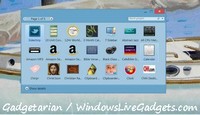If your PC suddenly became slow, read these tips for giving it some speed
1) Avoid installing new software, unless you are sure that you need it; in any case, always try carefully to estimate if an application is reliable before you install it.
2) Uninstall programs and games that you don’t use (no mercy!)
3) Deactivate programs that you don’t really need to run automatically each time you start Windows. Deactivate auto search for network folders and printers if you don’t really need it (Windows Explorer > Tools > Folder Options > View)
4) In case a program is available in both a zipped version (“unzip and run”), and in a setup version (“install and run”), prefer the zip version. Automatic installations are convenient, you won’t have to create new folders, unzip, create shortcuts, etc, but in manual installations you have more control on what happens to your computer and especially to your registry.
5) Avoid registry cleaners. Messing with the registry is dangerous and you may end up re-installing Windows instead of gaining speed. Especially as regards the registry, better be preventive, i.e. use a program like Revo Uninstaller, which will let you review and confirm (usually very few) registry changes, when you uninstall a program and it leaves some traces in the registry. Doing this per program will render the use of registry cleaners unnecessary.
6) Use a hard disk junk cleaner (Revo Uninstaller contains a tool like that) to clean your hard disk from useless files, such as files in temporary folders, Windows thumbnails databases, various log files, etc.
7) Increase your RAM (This involves spending some money, but RAM is cheap nowadays)
